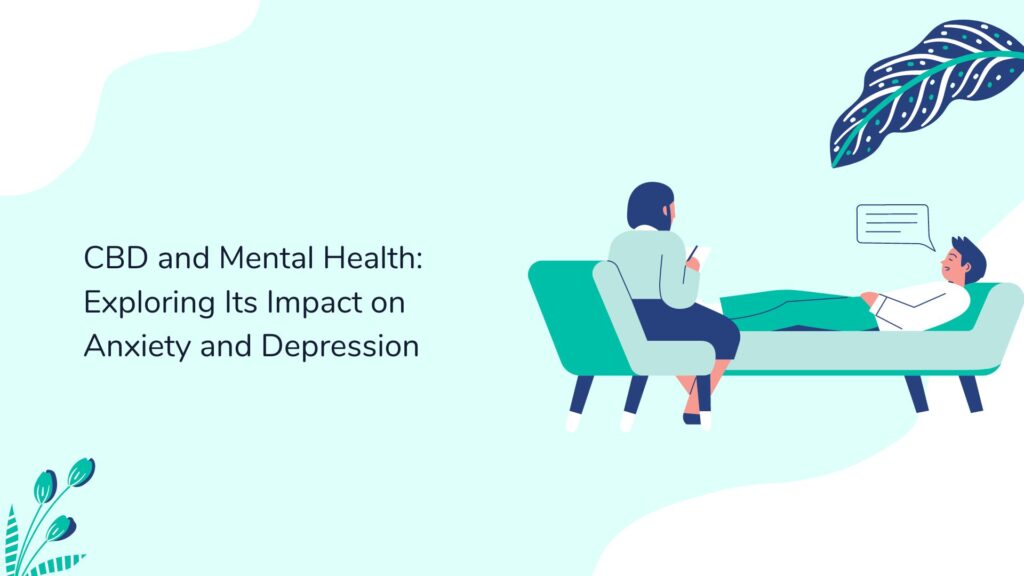
In recent years, Cannabidiol (CBD) has emerged as a beacon of hope in the realm of mental health, particularly for those battling anxiety and depression. Extracted from the cannabis plant, CBD is celebrated not only for its therapeutic properties but also for its non-psychoactive nature, distinguishing it from THC, the compound known for its euphoric effects. This article delves into the efficacy of CBD in managing anxiety and depression, providing a comprehensive analysis backed by scientific studies and personal testimonies.
What is CBD?
Cannabidiol, or CBD, is one of the many cannabinoids found in cannabis. Unlike THC, CBD does not induce a high, making it an appealing option for those seeking relief from various ailments without the psychoactive effects. Available in various forms such as oils, tinctures, edibles, and creams, CBD has infiltrated the market, offering an alternative to traditional pharmaceuticals.
Understanding Anxiety and Depression
Anxiety and depression are prevalent mental health disorders characterized by persistent worry, sadness, and a lack of interest in daily activities. These conditions can significantly impair an individual’s ability to function and enjoy life. Typically treated with medications and therapy, many sufferers continue to seek alternative therapies to mitigate side effects and find more natural solutions, leading them to CBD.
The Science Behind CBD’s Effects on Mental Health
CBD’s interaction with the body’s endocannabinoid system, which regulates mood, sleep, appetite, and pain, is pivotal in its potential as a mental health treatment. Studies suggest that CBD can enhance serotonin levels in the brain, mimicking the effects of antidepressants but without the harsh side effects. For instance, a 2019 study found that CBD could reduce anxiety in individuals before public speaking tasks. Similarly, preliminary studies on animals have shown that CBD can produce antidepressant-like effects, making it a subject of interest for future human trials.
Benefits of CBD for Anxiety and Depression
The anecdotal evidence supporting CBD’s effectiveness in treating anxiety and depression is substantial. Many users report a significant decrease in anxiety symptoms with regular CBD use. Some studies have even observed that CBD can help manage panic attacks, social anxiety disorder, and post-traumatic stress disorder (PTSD). For depression, the potential benefits of CBD are linked to its anti-inflammatory properties, which may affect mood regulation.
Challenges and Considerations
Despite the promising benefits, the use of CBD is not without its challenges. The legal landscape surrounding CBD can be confusing, as it varies significantly across different areas, with some regions having strict regulations. Additionally, the market’s saturation with unregulated products poses a risk to consumers who might end up with low-quality or mislabeled items. Users must be diligent in verifying the source, quality, and authenticity of CBD products by seeking those that offer third-party testing results.
User Testimonials and Case Studies
Personal accounts from individuals who have turned to CBD for mental health offer invaluable insights. For example, Emily, a 30-year-old graphic designer, shared that using CBD oil daily significantly alleviated her anxiety and helped her manage stress better, improving her overall quality of life. Such testimonials underscore the potential of CBD as a complementary treatment for anxiety and depression.
Expert Opinions and Future Research
While the initial findings are promising, health experts and researchers urge caution and more rigorous scientific studies to establish definitive evidence of CBD’s benefits and potential side effects. The consensus in the medical community is that while CBD could play a beneficial role in treating mental health issues, comprehensive clinical trials are necessary to formulate standard dosing, efficacy, and safety guidelines.
How to Start Using CBD for Anxiety and Depression
For those considering CBD, it’s important to approach this option methodically:
- Consult a Healthcare Provider: Always discuss with a healthcare professional before starting any new treatment, especially if you are already taking other medications.
- Quality Over Quantity: Opt for high-quality CBD products from reputable sources that provide proof of third-party testing.
- Start Low, Go Slow: Begin with a low dose and gradually increase it based on your body’s response. Monitor the effects closely and adjust as needed.
CBD presents a promising, albeit preliminary, alternative treatment for anxiety and depression. Its potential to act as a natural remedy offers a glimmer of hope for many who struggle with these debilitating conditions. However, individuals should proceed with caution, armed with knowledge and advice from medical professionals. As research evolves, CBD may become a more recognized and recommended tool in the mental health treatment arsenal.


